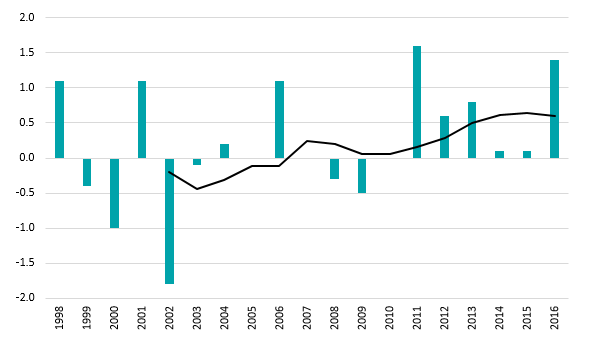This has been an election campaign full of chunky spending promises from both of the main political parties. The Conservatives have talked about “50,000 more nurses” and “20,000 extra police officers”. Labour has pledged an extra £26bn in real terms (£40 billion in cash terms) for day-to-day NHS spending. Labour’s manifesto mentions a £150 billion Social Transformation Fund to replace, upgrade and expand schools, hospitals, care homes and council houses.
The rationale for such hefty financial commitments rests on the assumption that the only way to get better public services is to spend more on said services. But this overlooks the potential for UK government to do more with the resources it already has at its disposal. That is, it overlooks the potential for our public sector to be more productive, and instead jumps to the conclusion that higher levels of spending and in turn higher rates of taxation are required.
This is despite the fact that the data on public sector productivity performance is truly parlous. According to the ONS, public sector productivity growth between 1998 and 2016 averaged just 0.2% per annum. Prior to the financial crisis, public sector productivity was often declining, with average growth of -0.1% per annum between 2000 and 2007. The “austerity” period 2010-2016 saw public sector productivity rise by on average of 0.7% per annum, suggesting that government has made some headway in “doing more with less”.
Figure: UK public sector productivity growth, %. Black line is a five year moving average

Source: ONS
Going forward, it is crucial that policymakers don’t lose sight of the need to bolster productivity in the public sector, and avoid jumping to the view that increased spending is the only way of improving the quality of our schools, hospitals, policing and other services. That is not to say that additional spending on services should be ruled out. But it is to say that spending should be well-justified and government should be ensuring that investment in public services is translating into greater efficiency and quality.
There is huge scope to improve public services through productivity-enhancing technologies, innovative forms of outsourcing (such as those based on outcomes-based contracts) and through finding other efficiency in government. It is a shame that our politicians in this election campaign have not talked about the great potential of ed-tech (using technology to provide tailored education services), predictive policing using big data or the more effective forms of healthcare delivery seen in other countries. Indeed, the NHS has been treated in this campaign like a sacred cow – irreproachable despite other countries doing public healthcare so much better.
Productivity growth sounds boring, but without it public services can only “do more with more”. That includes more taxes. If politicians don’t like the sound of that, then they better think a lot more about this issue.
